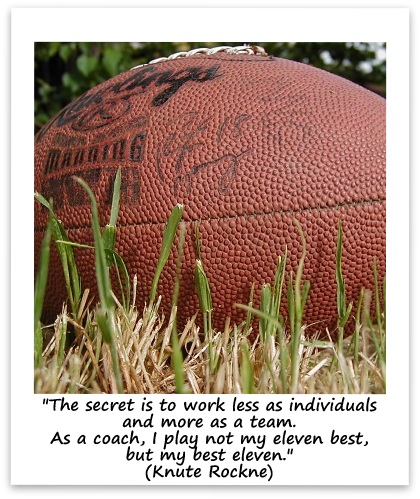With 20 years sports coaching experience DeAngelo Wiser specialises in leadership. In today’s guest post, which can be easily transposed into other team contexts, Coach Wiser shares some of his experience and knowledge of working with teams.
HOW WILL YOU WIN YOUR FIRST GAME….YOUR NEW TEAM?
by DeAngelo Wiser
Wiser Sports Leadership
 There’s nothing like coaching a team for the first time, whether it’s your very first job, or if you’ve been around awhile and are just taking over another team. How will you gain trust and convince them you have their best interests at heart? Why should they believe you’re different from, better than, or as good as the last coach or coaches they’ve dealt with?
There’s nothing like coaching a team for the first time, whether it’s your very first job, or if you’ve been around awhile and are just taking over another team. How will you gain trust and convince them you have their best interests at heart? Why should they believe you’re different from, better than, or as good as the last coach or coaches they’ve dealt with?
Parents and players in the audience don’t care if your record is 300-0, you’ve coached 100 All-Americans and won 7 National Titles. A successful past will certainly open many doors and extend your grace period of renewed hope for the program. But these parents and players are mainly concerned with what you can do for them.
That’s why one of the keys to getting off to a great start is to gear your comments toward them, not your accomplishments.
Certainly, each situation is different. But a team that’s had two or three coaches in a short span of time often is among the most challenging ones you could face. They will be callused to most of what you’re saying–they’ve heard the speech before and have become skeptical. Can you blame them? It becomes paramount that everything you say can be translated into immediate, concrete actions that are visible to the team.
What will make you different?
1. ACTIONS– Everyone associated with the team will hear 50% of what you say, but will be watching 100% of the time to see if your actions are true to your words. If you know you can’t deliver something, don’t say you’ll do it.
2. CREDIBILITY– Are you a coach of your word? Let players know as soon as possible if they aren’t the right fit for your system, and or you don’t see them playing much. Often upperclassmen from the previous year will still be on the team because the previous coach didn’t want to make the decision to let them go. Never think that players will “get the message” and leave on their own. Be strong and let them know before it gets out of hand. Disgruntled players can destroy your team.
3. HONESTY– If you make a mistake, admit it. If you see something that isn’t right, take care of it. Players need to know you’ll stand up for them and make the right decision based on expectations and values, not favorites.
4. PROMISES– This word should be used in a very meaningful way. Promises broken or never addressed will destroy your relationship with players and parents. A promise is an assurance that an expectation will be met.
5. VISION– Lay out your vision for the team, and begin work on it immediately. Mention it every day in how it relates to specifics in practice and games. The passion for that vision will spread to your players and continue to grow.
6. WORK ETHIC– Be a fireball of energy, passion and enthusiasm working at every chance. Be an example for your team and they will follow. Always outwork your team, and never have them do something you are unwilling to do.
7. CONSISTENCY– Never waiver in any decision with respect to expectations and discipline. Always be consistent. Players need to know you mean what you say. You can never make everyone happy, but you can base decisions on sound principles.
8. COMMUNITY PROJECTS– Get your team involved in important community projects. The chance to help others shows them life is more than a game.
The sense of accomplishment of helping others as a team is a feeling that cannot be matched.
9. INDIVIDUAL MEETINGS– Nothing means more to a player than having a coach who is willing to sit down, listen and meet with them on an individual basis. This is a wonderful time to discuss individual goals, and how you can help them become a reality.
10.TEAM BUILDING– Take the time to use any and all team building activities to bring your team together. If possible, take them on a ropes course. These are wonderful activities that challenge their decision making, leadership, teamwork and physical ability. If they’ve had several coaches they need that bond to tie them all together.
11. TEACH, TEACH, TEACH– At every opportunity teach your players goal setting, work ethic, expectations, motivation, personal discipline, nutrition, skills, tactical awareness, character, integrity, values, teamwork, leadership, respect, courtesy, humility, unselfishness, etc. You have a unique situation with a wonderful audience. Take advantage to make a difference in their lives.
It takes time for players from a team of many coaches to trust anything you say. There are no quick, “fast food” fixes. Don’t rush it. Remember that every day is a building block for you to prove that you have their best interests at heart and that you’ll do anything possible to help them be successful.
The beginning is always the most challenging. Selfish words from certain parents, an attitude from certain players, and the lack of skills and knowledge that you’re used to can be overwhelming. That’s when your true color will shine through.
This team needs you. Never doubt that this is the place you need to be and the joy of building this program will be one of the most rewarding aspects of your career. Anyone can coach a team of all-stars. The biggest challenge is to get them to play together. Show me a coach who can build a team from nothing, get them to believe in each other and accept their roles, and I’ll show you a coach of the year.
There’s a TV show that uses the phrase, “You are being watched every hour of every day.” It’s an appropriate phrase as you begin that new coaching job. While you can’t dwell on it, just keep in mind that your actions not your words will carry more impact with your players than anything else.
I wish you and your team the best in 2014.
About DeAngelo Wiser
Founder, Wiser Sports Leadership:
Experience in Coaching, Business and Teaching clearly give us the edge in assisting you, your team, and or business achieve their goals. We deal in what works, not theories.
Our leadership program for coaches, players, teams, organizations and business is based on five main principles as the foundation of success:
Character and Integrity as the cornerstones, with Optimism/Positive Outlook, Enthusiasm/Passion, and Confidence solidly placed between Character and Integrity. http://wisersportsleadership.blogspot.com/2013/07/laying-foundation-for-leadership.html
“Character and Integrity are worn everyday, regardless of the weather.”
“Leadership never rests”
“Lead with a passion”
Former Head Coach, High School Girls Soccer
20 years, 223 victories, currently ranked 4th all-time in state of KY, coached in 357 games.
4 State Playoff Elite Eights, 4 Regional Championships, 7 District Championships, 2 Regional Runner-ups
Kentucky High School Girls Coach of the Year
Kentucky Soccer Officials Sportsmanship Team of the Year
Owe it all to God, Wonderful Wife, Outstanding Players, and dedicated Assistant Coaches
35 players earned scholarships to collegiate level
Founder, Five Star Soccer Camps
Member NSCAA since 1994
National and Advanced National Diploma, NSCAA
Team Building, Motivation, Life Lessons and Bringing Teams Together are my passion!!
Compiling material for my book, “Coaching the Coach”
https://www.facebook.com/WiserSportsLeadership
http://wisersportsleadership.blogspot.com/
Twitter @coachwiser
co********@***il.com





 There’s nothing like coaching a team for the first time, whether it’s your very first job, or if you’ve been around awhile and are just taking over another team. How will you gain trust and convince them you have their best interests at heart? Why should they believe you’re different from, better than, or as good as the last coach or coaches they’ve dealt with?
There’s nothing like coaching a team for the first time, whether it’s your very first job, or if you’ve been around awhile and are just taking over another team. How will you gain trust and convince them you have their best interests at heart? Why should they believe you’re different from, better than, or as good as the last coach or coaches they’ve dealt with?
